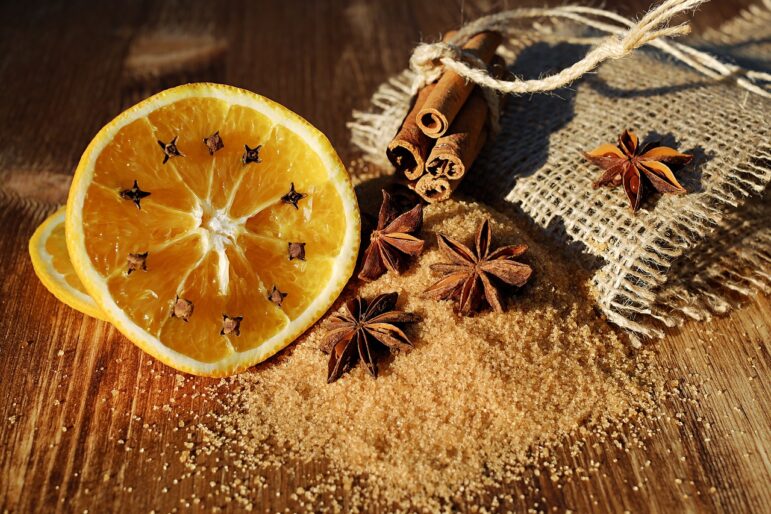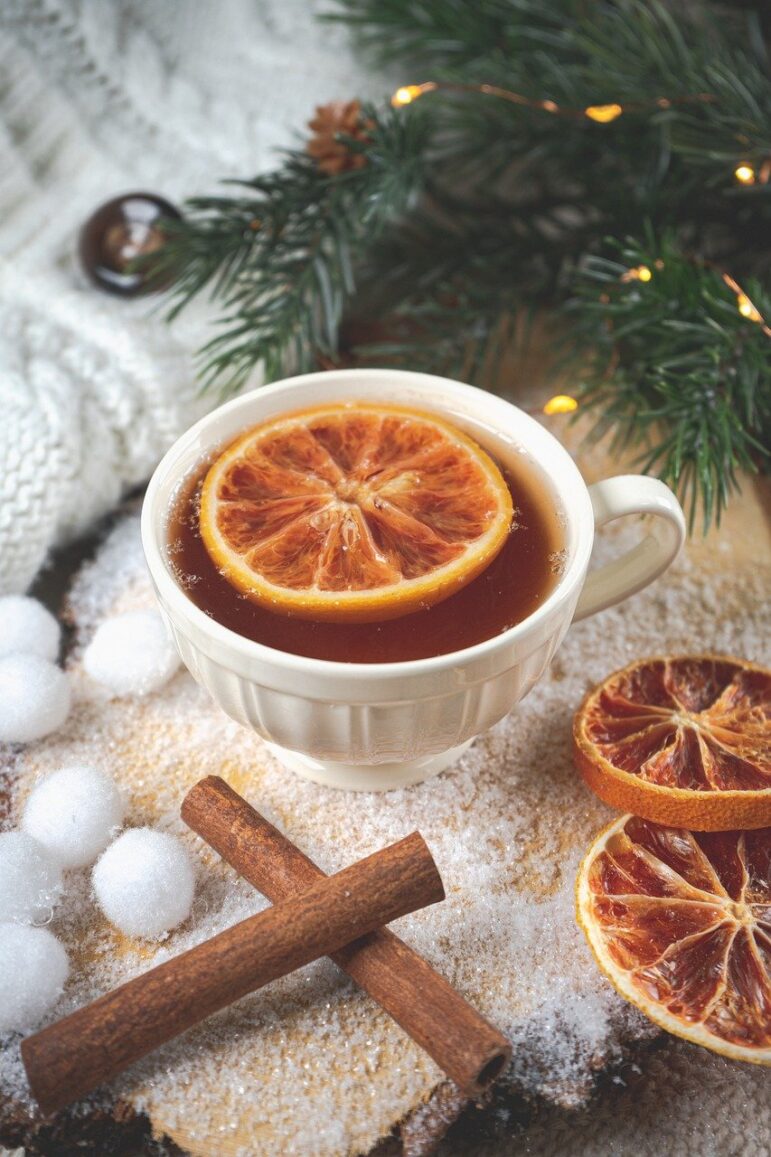
Today’s article comes to us from Siobhan Ball, a writer and archivist living in Edinburgh, Scotland. Siobhan has degrees in information management and medieval history, making her lots of fun at parties. She’s written for Autostraddle, Broadly, and Diva, and is currently working on a book on the supernatural women of Ireland for Wolfenhowle Press.
Nutmeg and cinnamon for luck and abundance. For safety and protection, clarity and spiritual power. Star anise gifts sweetness. Said to be an aid to divination it too lends protection to those who make use of it. Meanwhile ginger, a spiritual catalyst, amplifies and quickens; connecting us to the return of the sun through the element of fire.

Orange, cinnamon, star anise, sugar, and other spices [Couleur,Pixabay]
Our ancestors kept them stored in chests if they had them at all. Locked up with iron keys, doled out like salt and silver and the other precious substances that made the world move and the dark days brighter.
Now a year’s worth of cinnamon, nutmeg, or black pepper, can be acquired for less than a day’s wages, brought halfway round the world in hours or days on a journey that once took months, fraught with danger. The world we live in is a miracle that’s killing us all, and we don’t think about either of those things enough.
I love the Winter Solstice. A last day of quiet, of stillness, before the year bursts forward into light, where the energies that will feed new life lie dormant underground like a spring compressed, ready to set the future into motion. This world is beautiful, and the Solstice, in that quiet, cold, stillness, is an ideal day to meditate on that; on the things we owe this earth, and to each other, as much a part of the web of life as trees and foxes and all the rest of the natural world.
In my practice the year ends at Samhain but begins in Imbolc, the time between a liminal zone suited to reflection, for listening to the landscape and one’s own internal voice. The Winter Solstice, halfway between the two, an eve of transformation and rebirth, provides us with a perfect moment to step outside and do just that.
![]()
We hate to keep asking, but it is serious. Costs have hit us too.
We are grateful to our readers for your support, however it manifests. Right now, we need readers who can help fund Pagan journalism to help us continue serving the community. This is the type of story you only see here. This is how to help:
Tax Deductible Donation | PayPal Donations | Join our Patreon
We remain one of the most widely-read news magazines within modern Paganism, and our reporters and columnists remain dedicated to a vision of journalism for and about our family of faiths.
You can also help us by sharing this message on your social media.
As always, thank you for your support of The Wild Hunt!
![]()
This is where I bring us back to spices, because one way I like to do this is to go outside and stand near the trees with a hot drink warming my hands, and open myself to listen. It’s a small ritual, to connect with nature through all of my senses, including taste, to feel instead of think for once and express my gratitude for the abundance that allows us to survive the winter with relative ease.
And then later, when I feel that wordless communion is done, to move on to thinking and planning – about how I can better uphold my side of the great contract. The things I can do differently in the coming year to help protect and preserve the earth, and to deal better with the people who do that labour which allows the rest of us to take for granted a standard of living that our ancestors could never have imagined.
Traditional Yule spices, though they came to many of our ancestors long after Christianity had replaced the polytheism we’ve returned to now, are good aids to this process. Stimulating, and possessed of both physical and metaphysical properties that lend themselves to clarity and spiritual focus – not to mention all the different kinds of luck and protection attached to many of them – the spices featured in mulling sachets for wine or alcohol, or that come ready mixed with tea and coffee at this time of year, are practically a ritual in a packet.
But while packets and ready-made are more than fine if needed – we respect disability, access issues, and plain old exhaustion here – for those who have the time and ability then fresh is always better. This is especially true for ritual purposes, because it lets us start from the beginning, and engage with the ingredients in their individual forms.

A cup of tea surrounded by spices and oranges [Ylanite, Pixabay]
This is a mulling blend I use for basically everything, from mead to tea, though converting it into real measurements from eyeballing proportions and shaking jars into pots until it feels right took a lot more work than I thought it would. I had the help of a very loyal friend recipe testing for me to make sure I’d done it right (the first attempt was unfortunately bitter and will not be spoken of again).
Though I’ll skip this part if I’m just making it for a party or to cheer myself up with some festive tea, if am using the resulting drink for any kind of ceremonial or spiritual purpose I’ll gather the ingredients together before I begin and take a moment to centre myself and set intentions before taking that energy with me through each step of the process.
Yule Spiced Tea
Ingredients
- 1 liter of water
- 9 oz of black tea or 3 black tea bags
- 2 teaspoons of cinnamon or 2 cinnamon sticks
- 2 teaspoons ground nutmeg or equivalent grated
- 1 thumb or 2 inch piece of fresh ginger
- ½ an orange
Slice the ginger into strips and the orange into slices. If you’re using loose leaf tea pack it into a separate tea ball, reusable tea bags, or something else that will allow you to remove it separately from the spices. Put all the ingredients into the pot and cover with boiling water then leave to steep for five minutes. After five minutes remove the tea and allow to steep for a further five minutes before pouring. While I tend to drink mine black sweetening your tea with honey can add another layer of ritual significance to the drink.
Yule Spiced Mead
While I prefer a caffeinated drink for my Winter Solstice meditation, mead is one of the earliest (possibly the earliest) ritual substances, and another excellent option, especially if I am planning on a communal ritual of some kind. In order to produce a mulled mead with the same flavour and spiritual properties, use the same ingredients as above, substituting an entire bottle of mead for the water and holding the tea, of course, and simmer for 10 to 20 minutes on the stove. Taste it after 10 minutes and then again at 15 and take it off the heat as soon as you’re happy with the flavour.
The Wild Hunt is not responsible for links to external content.
To join a conversation on this post:
Visit our The Wild Hunt subreddit! Point your favorite browser to https://www.reddit.com/r/The_Wild_Hunt_News/, then click “JOIN”. Make sure to click the bell, too, to be notified of new articles posted to our subreddit.